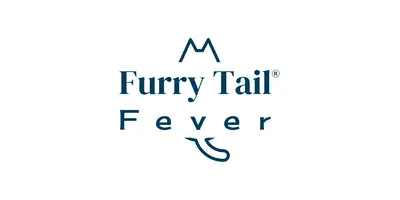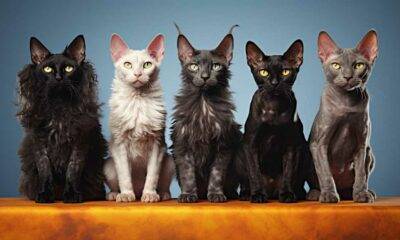Pets
All About Pets: Your Ultimate Guide to Pet Care
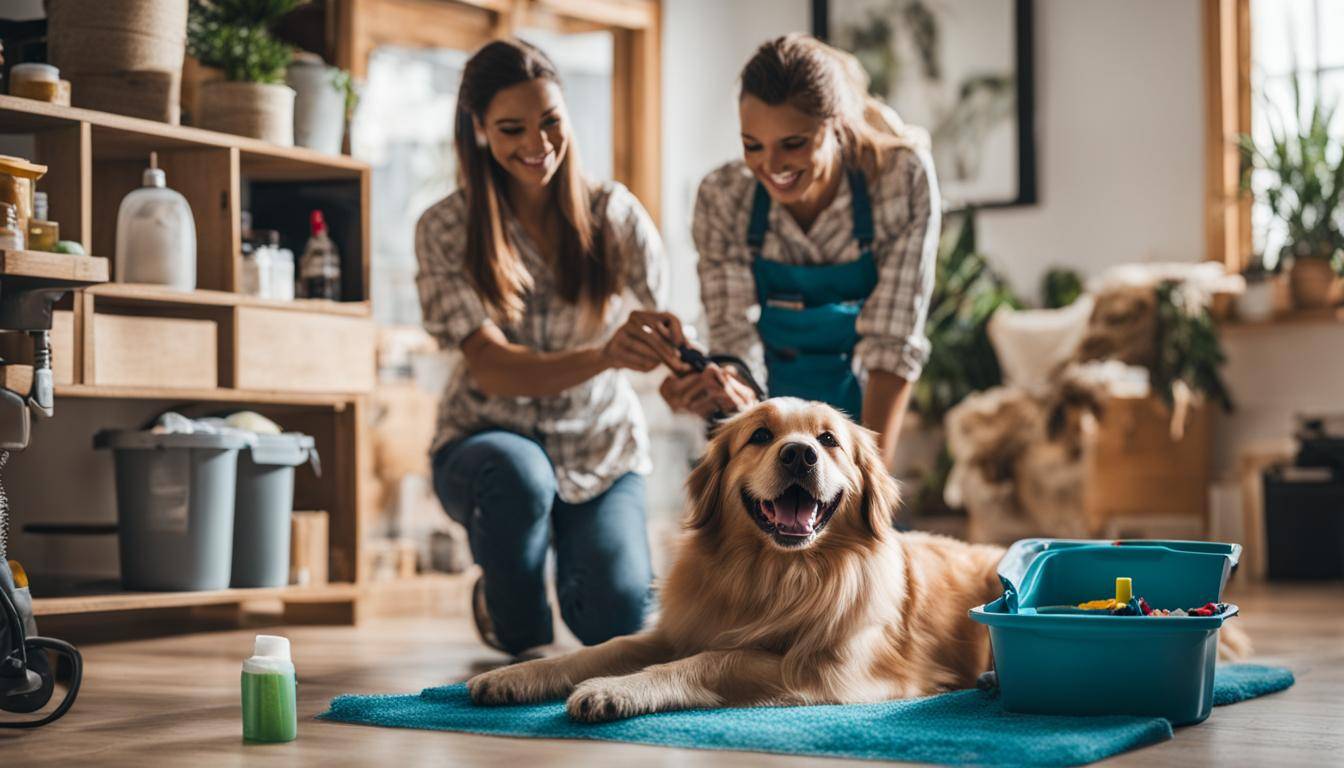
Proper pet care is essential for responsible pet ownership. When adopting a pet, you are making a lifetime commitment to their health and well-being. This guide will provide you with the necessities and tips for providing the best care for your furry family member. From nutrition to exercise and regular vet visits, every aspect of pet care is covered here.
Key Takeaways:
- Pet care is a lifelong commitment and responsibility.
- Proper nutrition is crucial for your pet’s health.
- Ensure your pet has access to fresh water and a safe shelter.
- Establish a proper bathroom routine for your pet’s hygiene.
- Regular exercise and socialization are important for your pet’s well-being.
Providing Healthy Nutrition for Your Pet
Pets, just like humans, require a nutritious diet to support their overall health and well-being. Choosing the right pet food is crucial in meeting their specific nutritional needs. Dog and cat foods are formulated to provide the essential nutrients they require, such as proteins, carbohydrates, fats, vitamins, and minerals. When selecting pet food, consider factors such as your pet’s age, breed, and any underlying health conditions they may have. Consult with your veterinarian for specific recommendations tailored to your pet’s needs.
It’s important to avoid feeding your pet table scraps, as these can be harmful to their health. Human food is often too high in salt, sugar, and unhealthy fats, which can contribute to obesity and other health issues in pets. Stick to feeding them specially formulated pet food that meets their nutritional requirements. Additionally, be mindful of portion sizes to prevent overfeeding, which can lead to obesity. Each pet has different caloric needs based on their size, age, and activity level, so consult your veterinarian to determine the appropriate amount of food to feed your pet.
In some cases, special diets may be necessary for pets with specific health conditions. For example, pets with allergies or sensitivities may require hypoallergenic diets that eliminate common allergens. Pets with kidney or urinary issues may benefit from diets that promote kidney health. If your pet has any health concerns, consult with your veterinarian to determine if a special diet is needed and what type of food would be most beneficial.
Table: Common Nutritional Requirements for Dogs and Cats
| Nutrient | Function | Sources |
|---|---|---|
| Protein | Builds and repairs tissues, supports immune function | Meat, fish, poultry, eggs, legumes |
| Fats | Provides energy, aids in nutrient absorption, supports healthy skin and coat | Meat, fish, oils |
| Carbohydrates | Provides energy | Grains, vegetables, fruits |
| Vitamins | Various functions in the body, including immune support and cellular processes | Fruits, vegetables, supplements |
| Minerals | Supports various bodily functions, such as bone health and muscle contraction | Meat, fish, fruits, vegetables, supplements |
Remember, proper nutrition is essential in ensuring your pet’s long-term health and preventing issues such as obesity and nutrient deficiencies. Regularly check the ingredient list of your pet’s food to ensure it contains high-quality ingredients and meets their specific nutritional needs. By providing a balanced diet and consulting with your veterinarian, you can give your pet the healthy nutrition they need to thrive.
Ensuring Proper Hydration and Shelter
Pets, like humans, need access to fresh water at all times. Ensure that your pet has a clean, fresh bowl of water available, and refill it regularly. Proper hydration is essential for their overall health and well-being. Remember to clean the water bowl regularly to prevent bacteria growth and keep the water fresh. Depending on the size and activity level of your pet, their water consumption may vary. Be observant and adjust the amount of water accordingly.
For pets that live in water, such as fish or turtles, it’s crucial to maintain the cleanliness of their tanks. Regularly clean their tank and replace the water to ensure their health and longevity. Monitor the water temperature and chemical balance to provide an optimal environment for your aquatic pets. Research the specific needs of your pet’s species to understand the best practices for maintaining their tank.
In addition to hydration, providing a safe and cozy shelter is vital for your pet’s well-being. Indoor cats are generally safer from external threats and should have a designated area where they feel secure and comfortable. Make sure to create an enriching environment with scratching posts, cozy beds, and toys to keep them entertained.
Outdoor dogs require a safe and secure shelter that protects them from extreme weather conditions. The shelter should provide shade during hot summer days and insulation during cold winters. Ensure that the shelter is well-ventilated and elevated to prevent flooding. It’s also important to provide proper identification for outdoor pets, such as a collar with a tag or a microchip, in case they wander off.
| Indoor Pets | Outdoor Pets | |
|---|---|---|
| Advantages |
|
|
| Disadvantages |
|
|
Establishing a Proper Bathroom Routine
When it comes to housebreaking your pet, establishing a proper bathroom routine is essential. Whether you have a dog or a cat, proper potty training is necessary for a clean and hygienic home. By following these guidelines, you can ensure that your furry friend understands where and when to relieve themselves.
Potty Training Dogs
If you have a dog, potty training is crucial to prevent accidents in your home. Start by designating a specific spot outdoors where you want your dog to do their business. Take them to this spot regularly, especially after meals and naps. Use positive reinforcement, such as treats and praise, to reward them for going in the correct spot. If accidents happen indoors, clean up the mess promptly and avoid scolding your dog, as it will only confuse them.
Litter Boxes for Cats
Cats are naturally inclined to use a litter box, but they still need to be trained on where to find it. Place the litter box in a quiet and easily accessible area in your home. Show your cat where it is and gently guide their paws in the litter. Most cats will instinctively use the litter box after this introduction. Keep the litter box clean and scoop it daily to ensure your cat’s bathroom hygiene.
Bathroom Hygiene for Pets
Whether you have a dog or a cat, it’s important to maintain their bathroom area clean and hygienic. Regularly clean and sanitize litter boxes, and dispose of waste properly. For outdoor dogs, regularly clean up their waste in the yard. This not only prevents odors but also helps prevent the spread of bacteria and parasites. By maintaining proper bathroom hygiene for your pets, you can ensure a healthy and comfortable environment for both them and your family.
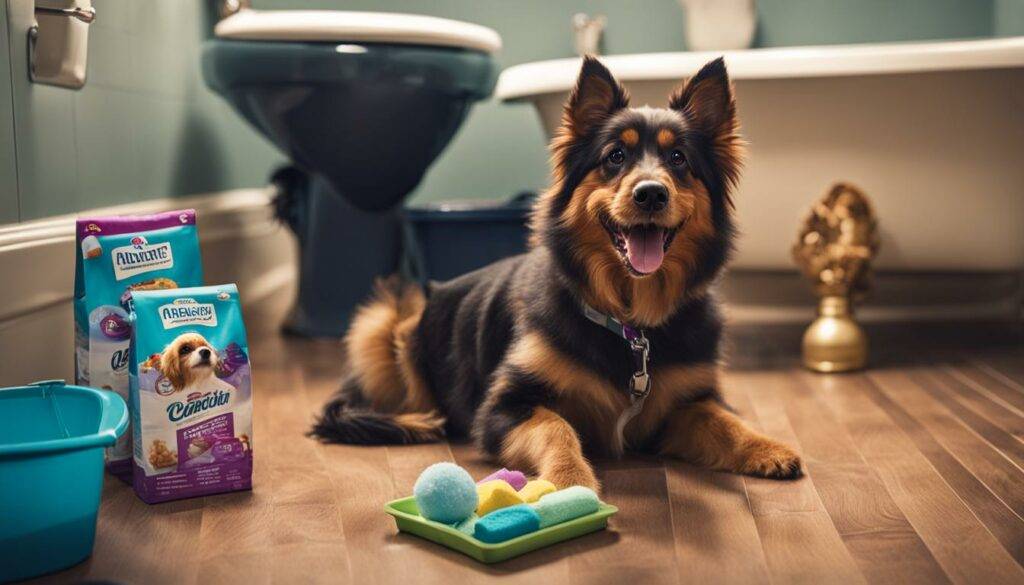
Keeping Your Pet Active and Socialized
Keeping your pet active and socialized is essential for their overall well-being. Regular exercise not only helps them maintain a healthy weight but also provides mental stimulation and prevents behavior problems caused by boredom. Additionally, socialization with other animals and humans is crucial for their development and happiness.
For dogs, daily walks are a must. Not only does it provide them with physical exercise, but it also gives them an opportunity to explore new scents and environments. Consider taking different routes to keep things interesting for both you and your furry friend. Interactive playtime is equally important for dogs and cats. Use toys that encourage mental and physical stimulation, such as puzzle toys or interactive laser pointers.
Socialization is key for pets to develop good social skills. Introduce them to other friendly animals and gradually expose them to different environments. Dog parks and pet-friendly events are great ways to socialize your pets with other animals and meet fellow pet owners. Remember to always supervise their interactions and ensure a positive experience for everyone involved.
Benefits of Pet Exercise and Socialization:
- Physical fitness and weight management
- Mental stimulation and reduced boredom
- Improved behavior and reduced aggression
- Enhanced social skills and confidence
- Stronger bond between pet and owner
“A tired pet is a happy pet. Regular exercise and socialization are essential for their overall well-being.” – Dr. Emily Smith, Veterinarian
Remember to tailor your pet’s exercise routine to their age, breed, and health condition. Consult with your veterinarian for specific recommendations and any limitations your pet may have. By providing them with regular exercise and socialization opportunities, you are ensuring a happy and fulfilling life for your beloved pet.
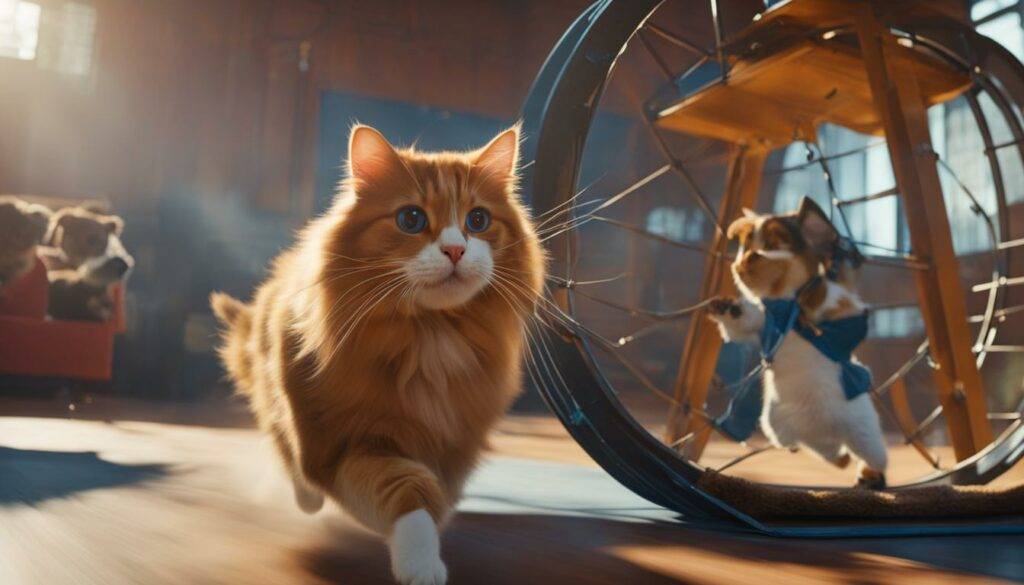
Conclusion
Proper pet care is essential for the health and happiness of your furry friend. By following this comprehensive pet care guide, you can ensure that you are providing the best possible care for your pet and fostering a strong bond between you. Responsible pet ownership is a lifelong commitment that brings immense joy and love into your life.
From providing nutritious food and fresh water to regular exercise and vet visits, every aspect of pet care contributes to their overall well-being. Remember, your pet relies on you for their physical and emotional needs. They trust you to keep them safe, healthy, and well-cared for. By being a responsible pet owner, you are ensuring that your pet not only survives but thrives.
Whether you have a dog, a cat, or a small furry friend, implementing the tips and guidelines in this All About Pets guide will make a significant difference in your pet’s life. Take the time to understand their specific needs and provide them with the necessary care they deserve. Your pet will thank you with love, loyalty, and endless cuddles.
FAQ
What should I feed my pet?
It’s important to choose the right food for your pet’s age, health condition, and breed. Consult with your veterinarian for specific recommendations for your pet’s diet.
Can I feed my pet table scraps?
Table scraps should be avoided, as they can be harmful to pets. Stick to pet-specific food to ensure their nutritional needs are met.
How much food should I give my pet?
Overfeeding can lead to obesity and subsequent health problems. Consult with your veterinarian to determine the right amount of food for your pet.
How often should I refill my pet’s water bowl?
Ensure that your pet has a clean, fresh bowl of water available at all times and refill it regularly.
How do I housebreak my pet?
Cats should have access to a litter box, while dogs should be taken outside or trained to use potty pads or doggy doors. Consistent training and frequent opportunities to relieve themselves are key.
How often should I clean my pet’s bathroom area?
It’s important to clean the pet’s bathroom area regularly to maintain cleanliness and prevent health issues.
How much exercise does my pet need?
Dogs should be walked daily, and playtime is important for both dogs and cats. Regular exercise provides mental stimulation and helps prevent behavior problems caused by boredom.
Can my pet benefit from socialization?
Yes, pets benefit from socialization with other animals and humans. Interaction with different environments and experiences can improve their people skills and overall happiness.
cats
Little Kitten My Favorite Cat – Play Fun Pet Care Kids Game – Fun Games For Kids & Children

By: ArcadeGaming
Title: Little Kitten My Favorite Cat – Play Fun Pet Care Kids Game – Fun Games For Kids & Children
Sourced From: www.youtube.com/watch?v=Hyju6Gwo_gs
cats
Guy Thinks He’s Lost His Foster Cat | The Dodo

By: The Dodo
Title: Guy Thinks He”s Lost His Foster Cat | The Dodo
Sourced From: www.youtube.com/watch?v=Jn4YJr_pWzY
cats
How To Train Your Cat: Two Methods You Need To Know

By: Cat School Clicker Training
Title: How To Train Your Cat: Two Methods You Need To Know
Sourced From: www.youtube.com/watch?v=LJVQINS8xFk
-

 cats8 months ago
cats8 months agoHow to Get Your Cats to Stop… Everything You Hate: Every No Needs a Yes!
-

 All Animals1 year ago
All Animals1 year agoALL about Lagomorphs Explained!
-

 All Animals11 months ago
All Animals11 months agoExplore the Wilderness: ALL about Carnivores Unleashed!
-

 Animals1 year ago
Animals1 year agoThe Wonders: ALL About Artiodactyls
-

 Cat Breeds7 months ago
Cat Breeds7 months agoWhat Are Some Rare Domestic Cat Breeds?
-

 Cat Breeds7 months ago
Cat Breeds7 months agoWhat Are the Top Family-Friendly Domestic Cat Breeds?
-

 Cat Breeds7 months ago
Cat Breeds7 months agoDiscover Rare Domestic Cat Breeds With Our Guide
-

 Cat Breeds7 months ago
Cat Breeds7 months agoTop Family-Friendly Domestic Cat Breeds
